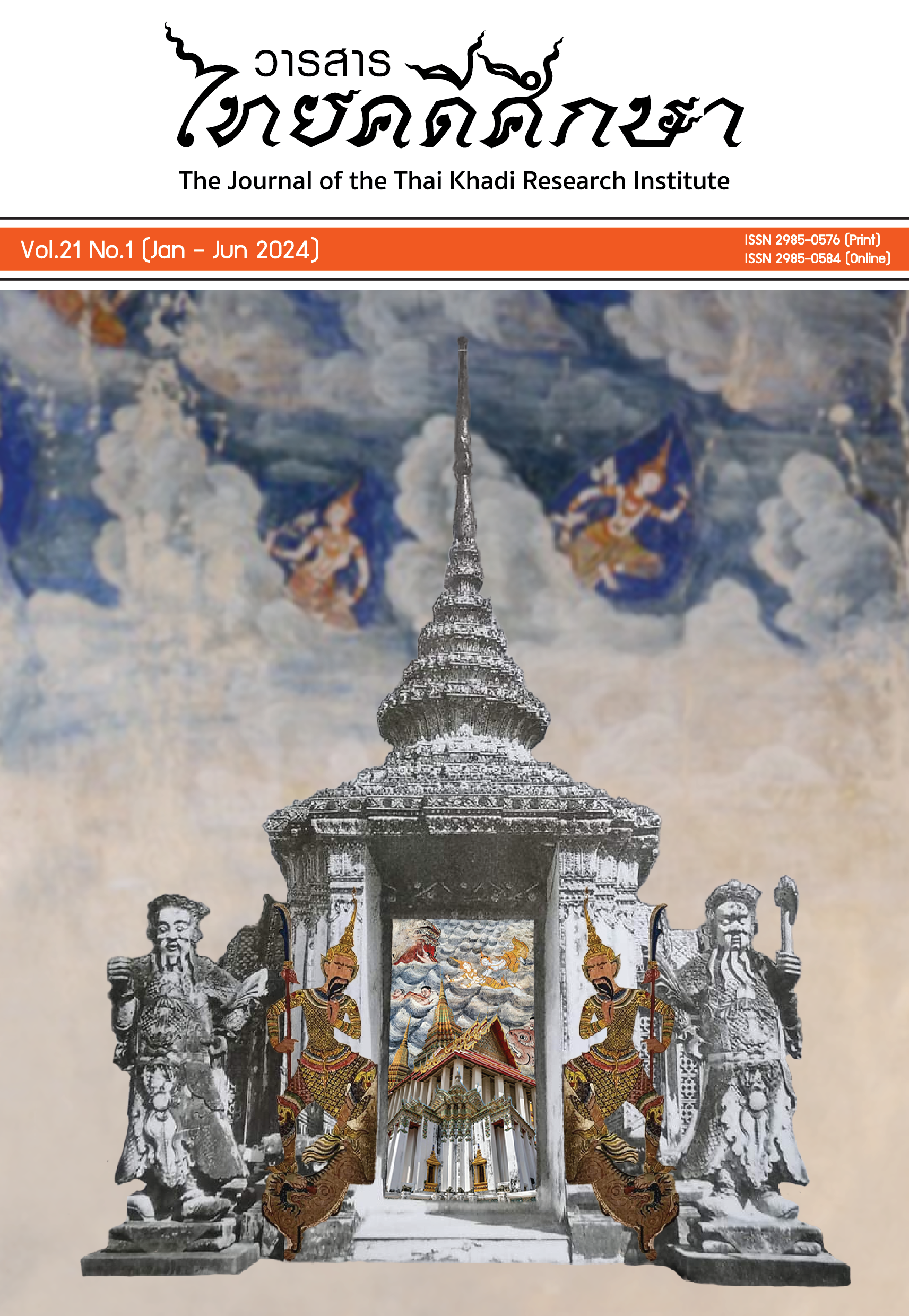วารสารไทยคดีศึกษา ได้ดำเนินมาถึงปีที่ 21 ฉบับที่ 1 บทความในฉบับนี้ยังคงได้รับความนิยมในฐานะสื่อกลางในการทำหน้าที่สะท้อนปรากฏการณ์ด้านศิลปวัฒนธรรมของสังคมไทยที่โดดเด่นในมิติที่แตกต่างหลากหลาย อาทิ ศิลปกรรม ประเพณี ประวัติศาสตร์ ตลอดจนวัฒนธรรมร่วมสมัยอย่างกีฬาและอาหาร ก็ได้ถูกถ่ายทอดและบรรจุอยู่ในวารสารฉบับนี้เช่นกัน
บทความแรก งานช่างต้นแบบในรัชกาลที่ 3 วัดพระเชตุพนวิมลมังคลาราม เขียนโดย ศักดิ์ชัย สายสิงห์ เป็นบทความที่วิเคราะห์รูปแบบศิลปกรรมที่สร้างขึ้นใหม่ในสมัยรัชกาลที่ 3 บนสมมติฐานที่ว่ารูปแบบของพระอุโบสถที่ปรากฏอยู่ในปัจจุบันที่สร้างขึ้นในสมัยรัชกาลที่ 3 เป็นงานรูปแบบใหม่ที่เกิดจากการผสมผสานรูปแบบกับงานแบบไทยประเพณี ซึ่งมีความแตกต่างจากงานแบบพระราชนิยม น่าจะเป็นงานต้นแบบให้กับอาคารรูปแบบนี้ในวัดอื่น และ/หรือรวมถึงอาคารในสมัยถัดมา ผู้อ่านจะได้เรียนรู้ถึงคุณูปการของงานช่างหลวง ที่เริ่มจากการเปลี่ยนแปลงรูปแบบและคติการสร้างอย่างสำคัญ ที่มีทั้งส่วนที่รักษารูปแบบงานช่างไทยประเพณี และส่วนที่ประยุกต์ใช้งานรูปแบบใหม่จนเกิดเป็นความลงตัว กลายเป็นต้นแบบและพัฒนาการสำคัญของงานช่างไทยสืบมา
ไล่เรียงมาที่บทความถัดมา วัดม่วง อำเภอบางปะหัน จังหวัดพระนครศรีอยุธยา: จิตรกรรมไทยประเพณีที่สะท้อนงานช่างหลวงนอกพระนครในสมัยรัชกาลที่ 5 เขียนโดย ศิรพร กวินสุพร ที่ตรวจสอบเรื่องราวแบบแผน เทคนิค และรูปแบบในการนำเสนองานจิตรกรรมฝาผนังวิหารวัดม่วง จนได้ข้อค้นพบว่า งานจิตรกรรมดังกล่าวเป็นตัวอย่างสำคัญที่สะท้อนภาพงานจิตรกรรมไทยประเพณีในสมัยรัชกาลที่ 5 ที่เขียนขึ้นนอกราชธานีโดยได้รับอิทธิพลจากงานช่างในราชธานีอย่างชัดเจน บทความนี้ช่วยให้เกิดความความรู้ความเข้าใจเกี่ยวกับวิวัฒนาการด้านงานจิตรกรรมฝาผนังของไทยได้เป็นอย่างดี
ตามมาด้วยบทความ ความเข้าใจต่อคำว่า “สยาม” “ไทย” และ “ลาว” ก่อนคริสต์ศตวรรษที่ 19 เขียนโดย ฐนพงศ์ ลือขจรชัย ที่ใช้หลักฐานในท้องถิ่นและบันทึก การเดินทางของชาวตะวันตกเป็นเครื่องมือสำคัญในการค้นหาคำตอบของคำถามที่ว่า คำว่า “สยาม” “ไทย” และ “ลาว” มีความหมายเหมือนกันหรือไม่? ทำไมสยามหลังการปฏิรูปสมัยรัชกาลที่ 5 ได้พยายามจะเปลี่ยนให้ “คนลาว” กลายเป็น “คนไทย” ไม่ใช่ “คนสยาม”? และคำว่า “สยาม” “ไทย” และ “ลาว” มีความสัมพันธ์กันอย่างไร? ผู้อ่านจะได้ทราบถึงที่มาที่ไปของการดำรงอยู่ของชาติไทยและลาวที่แยกออกจากกันอย่างชัดเจน จนกลายเป็นรากฐานของการสร้างชาติไทยและลาวในเวลาต่อมา
ถัดมาที่บทความ งานเขียนประวัติศาสตร์และการสร้างเกียรติศักดิ์กองทัพบกสยามทศวรรษ 2450 - 2460 เขียนโดย ภัทรัตน์ พันธุ์ประสิทธิ์ ที่สำรวจงานเขียนประวัติศาสตร์ของกองทัพบกสยามช่วงทศวรรษ 2450 - 2460 จำนวน 4 เรื่อง เพื่อวิเคราะห์งานเขียนประวัติศาสตร์กองทัพบกสยาม ว่านำเสนอความคิดเกี่ยวกับความเป็นทหารและอุดมการณ์ทหารอย่างไร ผ่านการให้ภาพบริบทเบื้องต้น วิเคราะห์งานเขียน และกระชับภาพรวมให้ชัดเจนในตอนท้าย บทความนี้ชี้ให้เห็นว่างานเขียนประวัติศาสตร์ของกองทัพบกสยามมีความสำคัญในฐานะเครื่องมือของการสร้างเกียรติยศของทหารและกองทัพ ก่อให้เกิดสำนึกร่วมกันภายในกรมกอง ส่งผลต่อความภาคภูมิใจในการทำหน้าที่รับใช้ชาติและพระมหากษัตริย์ของพลทหาร
การใช้วัฒนธรรมในฐานะเครื่องมือยังคงปรากฏต่อเนื่องที่บทความ กีฬากับการเมือง: กีฬาแหลมทองในฐานะเครื่องมือนโยบายต่างประเทศของไทย เขียนโดย จินตวัฒน์ ศิริรัตน์ ที่ศึกษาและวิเคราะห์คุณค่าของกีฬาแหลมทองที่นอกเหนือจากความร่วมมือด้านกีฬา ยังเป็นเครื่องมือสำหรับนโยบายต่างประเทศของไทยในหลายด้าน อาทิ การเป็นเครื่องมือส่งเสริมแนวคิดต่อต้านคอมมิวนิสต์ การเป็นเครื่องมือสานสัมพันธ์ระหว่างไทยกับประเทศภาคพื้นทวีป และการครองความเป็นเจ้าในภาคพื้นทวีปในสมัยจอมพลสฤษดิ์ ธนะรัชต์ สะท้อนให้เห็นว่าวัฒนธรรมของประชาชนอย่างกีฬา มิได้มีเพียงหน้าที่ที่ใสซื่อ ตอบสนองความต้องการในการแข่งขัน หรือการออกกำลังกายเท่านั้น หากแต่กีฬายังสามารถตอบสนองต่อเป้าหมายนโยบายต่างประเทศในยุคสงครามเย็น และเป็นข้อพิสูจน์ว่า ในเอเชียตะวันออกเฉียงใต้กีฬากับการเมืองเป็นของคู่กันมาอย่าง ช้านาน
ความน่าสนใจของการศึกษาปรากฏการณ์ด้านศิลปวัฒนธรรมมิได้จำกัดอยู่แค่คำถามของการวิจัยหรือวัตถุประสงค์องการวิจัยเท่านั้น แต่ความน่าสนใจยังสามารถ หยั่งลึกไปถึงระดับวิธีวิทยา ดังปรากฏในบทความเรื่อง การบุกเบิกการประยุกต์ใช้กิจกรรมทางการละครในการส่งเสริมการจัดการความรู้ เขียนโดย มงคลชัย วิริยะพินิจ ที่เป็นการวิจัยเชิงบุกเบิกเพื่อทำการศึกษาการบุกเบิกในการส่งเสริมการจัดการความรู้โดยการประยุกต์ใช้กิจกรรมทางการละครในบริบทของการเรียนการสอน การวิจัยนี้ใช้วิธีการวิจัยเชิงคุณภาพซึ่งเก็บข้อมูลวิจัยจากผู้เรียนโดยแบบสอบถามปลายเปิดและบันทึกจากการเรียน จนท้ายที่สุดผลลัพธ์จากการศึกษาสามารถสร้างเสริมทักษะต่าง ๆ ที่เอื้อต่อการจัดการความรู้ อาทิ การทำงานเป็นทีม ภาวะผู้นำ การเล่าเรื่อง และการสื่อสารแบบปฏิสัมพันธ์ อันเกิดคุณูปการทั้งในเชิงวิชาการและเชิงปฏิบัติการ ที่สามารถนำไปประยุกต์ใช้ในบริบทสังคมอื่นนอกเหนือไปจากกรณีศึกษาในบทความชิ้นนี้อีกด้วย
มาสู่บทความเรื่อง วันทอง 2021: การดัดแปลงเสภาขุนช้างขุนแผนในอุตสาหกรรมการดัดแปลง เขียนโดย ประภากร คล้ายสมาน และ ณัฐกาญจน์ นาคนวล ที่ศึกษาการดัดแปลงเสภาขุนช้างขุนแผนเป็นละครโทรทัศน์วันทอง 2021 ในอุตสาหกรรมการดัดแปลง แสดงให้เห็นกระบวนการดัดแปลงละครโทรทัศน์ในยุคโทรทัศน์ดิจิทัล ผ่านการตีความใหม่ การวางโครงเรื่องให้มีมิติ มีความเชื่อมโยงระหว่างตัวละคร เหตุการณ์ รวมถึงองค์ประกอบอื่น ๆ ตลอดจนมีการหยิบยกเอาประเด็นต่าง ๆ ที่เกิดขึ้นในสังคมมาตีแผ่เพื่อสร้างกระแสตอบรับและทำให้เกิดการถกเถียงของผู้ชม นับเป็นการตั้งคำถาม แสวงหาคำตอบ และวิเคราะห์สะท้อนไปมาระหว่างสิ่งที่เกิดขึ้นแล้วในอดีต กับปรากฏการณ์ทางสังคมที่เกิดขึ้นในปัจจุบันได้อย่างน่าสนใจ
สุดท้ายแต่ไม่ท้ายสุด คือบทความที่เกี่ยวข้องกับศิลปวัฒนธรรมร่วมสมัย ในมิติอาหารและการท่องเที่ยว เรื่อง การสร้างเรื่องเล่าเพื่อการท่องเที่ยวเชิงอาหารชุมชนมอญทองผาภูมิ เขียนโดย องค์ บรรจุน ที่มุ่งสร้างเรื่องเล่าผ่านการสร้างการมีส่วนร่วมกับชุมชนว่าด้วยอาหารที่สัมพันธ์กับประวัติศาสตร์และชุมชนชาติพันธุ์ เพื่อเป็นเครื่องมือในการส่งเสริมการท่องเที่ยวเชิงอาหารชุมชนมอญทองผาภูมิ ก่อให้เกิดข้อค้นพบที่ว่า วัฒนธรรมอาหารของมอญ ยังคงหยั่งรากจนเกิดการเลือกใช้เรื่องเล่าประวัติศาสตร์วัฒนธรรมอาหารเพื่อการอนุรักษ์ฟื้นฟูวัฒนธรรม เกิดทั้งการสร้างรายได้ชุมชน สร้างการรับรู้ใหม่แก่นักท่องเที่ยว และสร้างการยอมรับจากองค์กรภาครัฐ ผ่านการปรับปรุงเปลี่ยนแปลงเรื่องเล่าในบางแง่มุม เพื่อสร้างตัวตนจากเรื่องเล่าประวัติศาสตร์และวัฒนธรรมในอดีตเพื่อรับใช้ชีวิตปัจจุบัน
นอกจากนี้ วารสารไทยคดีศึกษาฉบับนี้ยังมีบทวิจารณ์หนังสือ ยุคสมัยและกษัตริย์อย่างใหม่ในพระราชพิธีสิบสองเดือน เขียนโดย ธงชัย วินิจจะกูล พิชญา สุ่มจินดา วิภัส เลิศรัตนรังษี และอาทิตย์ ศรีจันทร์ วิจารณ์โดย นิธิ เนื่องจำนงค์ โดยผู้วิจารณ์ได้สังเขปหนังสือแต่ละบท โดยชี้ให้เห็นข้อสนทนาทางความคิดระหว่างผู้เขียนแต่ละท่านอีกด้วย ผู้วิจารณ์ได้แสดงทัศนะหลังการอ่านหนังสือเล่มนี้ใน 3 ประเด็นได้แก่ 1) คุณูปการสำคัญต่อแวดวงไทยคดีศึกษา 2) ความโดดเด่นของ “พหุวิทยาการ” (multi - disciplinary) ในการศึกษา ที่เป็นการประยุกต์ใช้ศาสตร์หลากหลาย มาวิเคราะห์ “วัตถุหรือโจทย์หรือประเด็นปัญหาในการศึกษา” เดียวกัน และ 3) ความโดดเด่นของข้อเสนอในหนังสือ ผู้วิจารณ์ให้ทัศนะว่าหนังสือเล่มนี้ช่วยเปิดพรมแดนทางการศึกษา สร้างความเข้าใจในปรากฏการณ์ทางประวัติศาสตร์สังคมได้ดีขึ้น ขยายขอบเขตของการทำความเข้าใจ และเป็นตัวอย่างในการศึกษาปรากฏการณ์ทางสังคมลักษณะนี้ได้อย่างดี
ท้ายที่สุดนี้ กองบรรณาธิการหวังเป็นอย่างยิ่งว่าวารสารไทยคดีศึกษาจะยังคงเป็นแหล่งรวบรวมความคิดสร้างสรรค์ทางวิชาการ ที่สร้างแรงบันดาลใจและสนับสนุนความหลากหลาย ทั้งในด้านศิลปะ วัฒนธรรม ตลอดจนวิถีชีวิตของผู้คน สื่อสารผ่านบทความทันสมัยและสร้างแรงขับเคลื่อนให้แก่ผู้อ่าน ผู้สนใจ และสังคมสืบไป
เผยแพร่แล้ว: 2024-06-25


